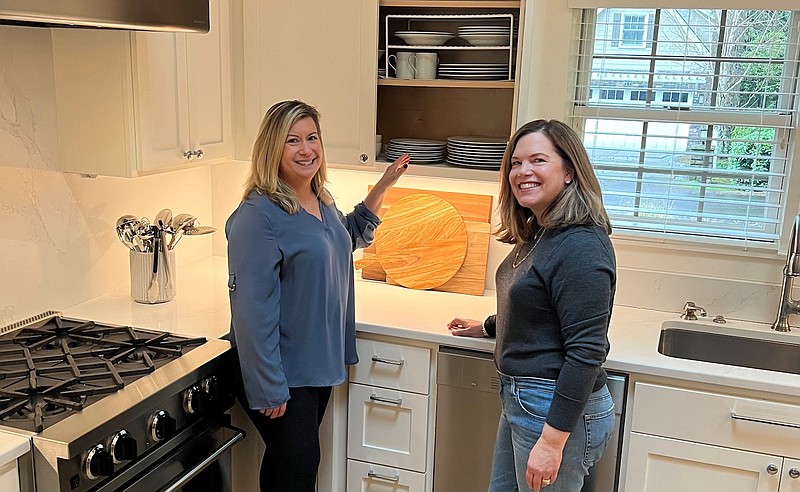One needs courage and more than a little trust to let an outsider come into her home to rifle through personal belongings with the goal of streamlining the homestead for its greater good.
That's why Jennifer McCarthy, of Lake Oswego, Ore., did what any brave, motivated wife and mother would do. She had a professional organizer start in her husband's home office.
The office lay somewhere beneath piles of papers. "He has never been any good at filing," McCarthy said of her husband, an instructor of graduate business classes at a local university, who welcomed the help. "He has to see what needs to be done, and that won't happen if papers are tucked in a file drawer."
Enter Danielle "Dani" Tanner Liu, a certified professional organizer and owner of Totally Orderly. She understands the out-of-sight-out-of-mind mentality, so she worked with his style and created a cubby system for mail and papers that he could see into. Anything to do with his rental properties went into one cubby, papers related to his work with the Cub Scouts in another, bills to pay in another, and so on.
"He could see it all from his desk, but it was off his desk," McCarthy said. "It was ingenious."
Next, Liu helped McCarthy organize her kitchen, then her daughters' closets. Today, three moves and 15 years later, Liu has made almost every area of the McCarthy home function better.
"A little chaos is OK for a while, but I cannot live in clutter," said McCarthy, 61, who works part time at the local high school coordinating the volunteer program. "Things have to be in place and have a place or I cannot do my everyday life whether that involves being home with kids or doing work projects at home."
As their three kids began moving out, the couple downsized from a 4800-square-foot house to 3,100-square-feet, then to a 2500-square-foot house they built. "Dani helped me think ahead and visualize what would go where," McCarthy said.
Along the way, Liu also helped McCarthy's husband, at his invitation, pare 30 boxes of memorabilia, including a box of about 25 baseballs, down to four boxes and one baseball.
"He and I had some epic sessions," said Liu, a board member of the National Association of Productivity & Organizing Professionals, and president of its board of certification program.
"Dani understands the issues people have with their stuff," McCarthy said. "The work is much more emotional and psychological than you think."
Over the years, McCarthy estimates she has paid a few thousand dollars for Liu's services. "I would have paid more. It's been so worth it," McCarthy said, adding, "A good organizer helps keep the clutter down, too, because the whole family knows where stuff goes."
In a family home, that is the key to ending clutter.
"In other words," I say, to make sure I've heard correctly: "The linen closet has just linens, not dog toys?"
Jeanann McCoy, another longtime client of Liu's and mother of six, concurs: "The house stays neat because everybody knows where everything belongs. Once things have a place that makes sense, they tend to get back there and stay there."
"This isn't rocket science," Liu said, "but there is a science to it. Because people who live together connect to things in different ways, the process involves knowing those differences, respecting them, and creating systems that become habits that the whole family will adhere to."
That's all.
Notably, neither of these women had messy homes to start with, Liu said. "Their houses were spotless." But looks can deceive: Clean does not always mean organized.
So I asked these women what else they learned from the process that might help the rest of us:
◼️ Get in the zone. McCarthy's house runs on stations. "If it has to do with baking, it goes here. If it has to do with grilling, it goes here," she said. "Everything related to coffee is in the coffee station. If it's sharp, it goes in this drawer. It's as easy as that."
◼️ Sort it out. Only when you put like items together do you realize you have eight sets of measuring cups, she said. That's a terrific way to start decluttering.
◼️ Pick someone you like. If you want to work with an organizer, talk to a couple. You have to like the person, McCarthy said. "It's a personal relationship. You're working together often in close quarters. They are touching your stuff and dealing with your emotions. You have to want to hang with them."
◼️ Have trust. Certified professional organizers are bound to a code of professional ethics that includes guarding clients' privacy. Whether they are privy to financial documents, medications, items of a personal nature, or family arguments, they keep it confidential.
◼️ Don't be afraid. Organizers don't force you to get rid of stuff. This is a common misconception. "However, they do help you see your things in new ways," McCoy said. "Dani is good at saying, 'Do you really want these?' Then you can choose to get rid of stuff. Once on a roll, that awareness helps you keep going."
Join me next week when I hire a professional organizer to come to my house.
Marni Jameson is the author of six home and lifestyle books, including "What to Do With Everything You Own to Leave the Legacy You Want."
